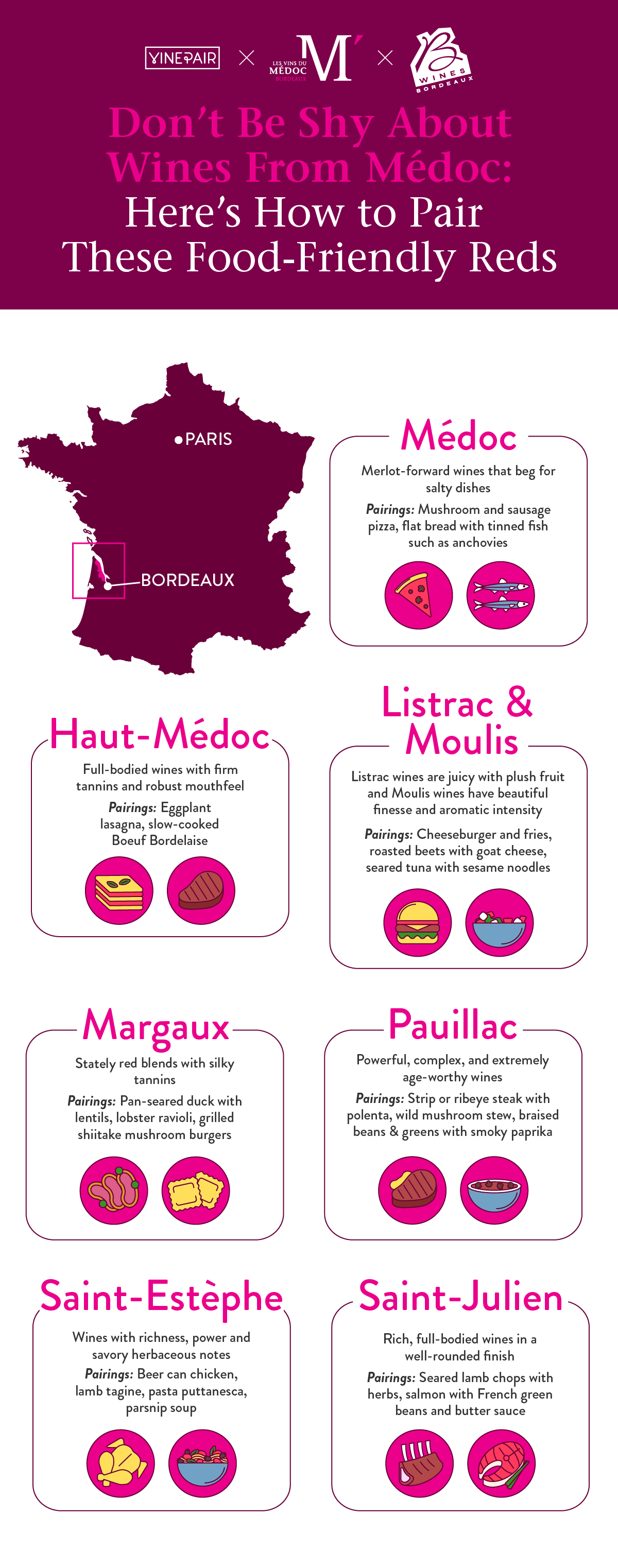![Don’t Be Shy About Wines From Médoc: Here’s How to Pair These Food-Friendly Reds [Infographic]](http://vinepair.com/wp-content/themes/vpcontent/images/blank.gif)
The Médoc, situated on the Left Bank of Bordeaux, is known for producing world-class reds that collectors cherish for their exemplary structure and cellar-worthiness. However, Médoc’s jewels aren’t only accessible to those with deep pockets and their thirsty inner circles. In addition to its renowned grands crus classés, this iconic appellation is also home to a widening range of “petits châteaux” that offer wines made by the next generation of producers, boasting the pedigree of Médoc and a food-friendliness that’s through the cellar roof.
A diversity of microclimates — Atlantic Ocean breezes, rolling rivers, the dense pine forest — along with mixed clay, limestone, sand, and Garonne gravel soils — are ideal for producing varied takes on classic grapes. As fall approaches, there may be no better time to enjoy Médoc wines.
Mary Gorman-McAdams, MW, says the wines are all about balance. “Médoc wines are neither too bold and powerful nor too light and delicate. They are blessed with wonderful bright acidity that lifts the palate.”
She adds that their tannins provide structure to match hearty, protein-rich meat dishes splendidly. But with “a medley of delicious black and red fruit, a distinct minerality, and sense of place that adds dimension,” the wines, even when opened young (don’t let the idea of tannins scare you!), also pair well with vegetarian pastas, stews, and roasts.
Médoc’s eight appellations offer a range of styles and prices while all sharing a typicity in their blends. The region also notably has a commitment to sustainability, with 91 percent of vineyards cultivated according to environmentally sound practices.
Tailor-made for autumn, these graceful reds complement a variety of foods. Lindsay Thomas, Director of Wine & Beverage at the River Oaks Country Club, shares that these wines can stand up to bold dishes while deftly navigating more subtle and delicate flavors. “The striking freshness even in older Médoc wines can be a lively partner for lighter meals or act as a counterpoint for richer cuisine.”
Cabernet Sauvignon is the dominant grape of the Saint-Estèphe, Pauillac, Saint-Julien, and Margaux AOCs. In Médoc, Haut-Médoc, Listrac-Médoc, and Moulis-en-Médoc, Merlot generally plays a greater role in the blends. While those two famed varieties are the core of the blends, Cab Franc and Petit Verdot add further layers of complexity. The former adds a lift with fresh berry notes, according to Gorman-McAdams, while the latter offers spice and dark plummy fruit.
Cheron Cowan, Director of Beverage, Craft Restaurant, agrees that Médoc wines are so food-friendly because of their tendency for elevated acidity. “Because the wines are blends, even in warmer vintages, there is more possibility for balance, providing versatility for a myriad of foods.”
As we gather for heartier fare this season, here are some Médoc wines and a few of our favorite dishes to go with them.

Click here to read Everything You Need to Know About Bordeaux’s Médoc Region.
This infographic is sponsored by Médoc Wines.
![Don’t Be Shy About Wines From Médoc: Here’s How to Pair These Food-Friendly Reds [Infographic] Don’t Be Shy About Wines From Médoc: Here’s How to Pair These Food-Friendly Reds [Infographic]](https://vinepair.com/wp-content/uploads/2024/10/medoc-infographic-card.jpg)